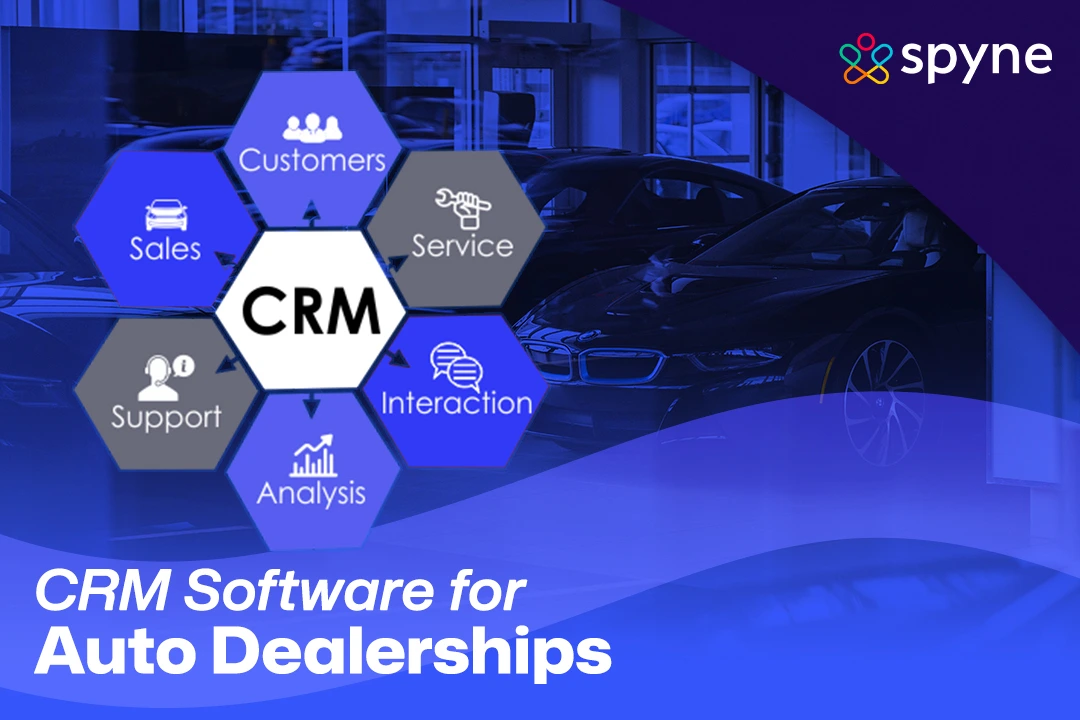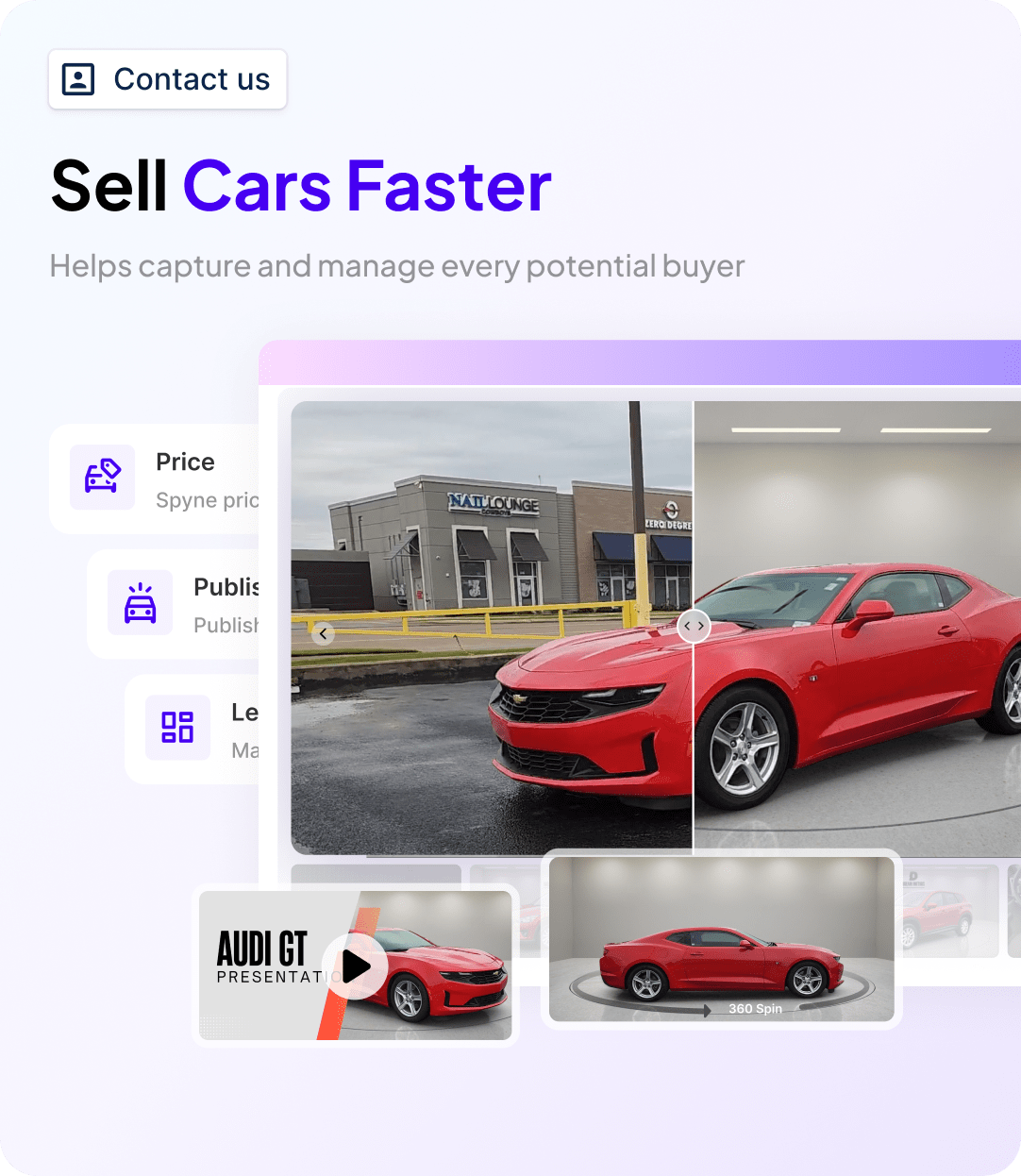It can be difficult to manage customer relationships in an automotive market that’s so competitive. But don’t worry, that’s where CRM software for auto dealerships steps in. This software is designed to combine customer data, manage leads with ease, automate marketing and follow-ups, and make your dealership’s operations ten times easier. So, your efforts are no longer haphazard but are streamlined and increase profitability.
Keep reading to find out the benefits and features of a good car dealer CRM software, the top names in the industry, and how choosing the right AI-powered solution can give you results unlike any other.
What is CRM Software for Auto Dealerships?
CRM software for auto dealerships is a platform that’s used to monitor and improve existing customer interactions and strengthen bonds with new sales opportunities. It helps boost customer satisfaction and increase productivity by enabling dealers to easily track customer data, track communication by email, phone, forms, and social media, and automate regular sales and service tasks. What’s even better is that all these tasks are done from a single dashboard, so there’s reduced room for error and lots of opportunities to improve.
For example, suppose a customer files a complaint about a post-service issue. In that case, the CRM can automatically log the complaint, alert the service team, and send an automatic email to the customer, all without manual intervention.
An advanced automotive dealer CRM manages processes within all departments, allowing dealerships to send out targeted marketing campaigns, manage sales pipelines, and create personalized experiences at every point in the sales process.
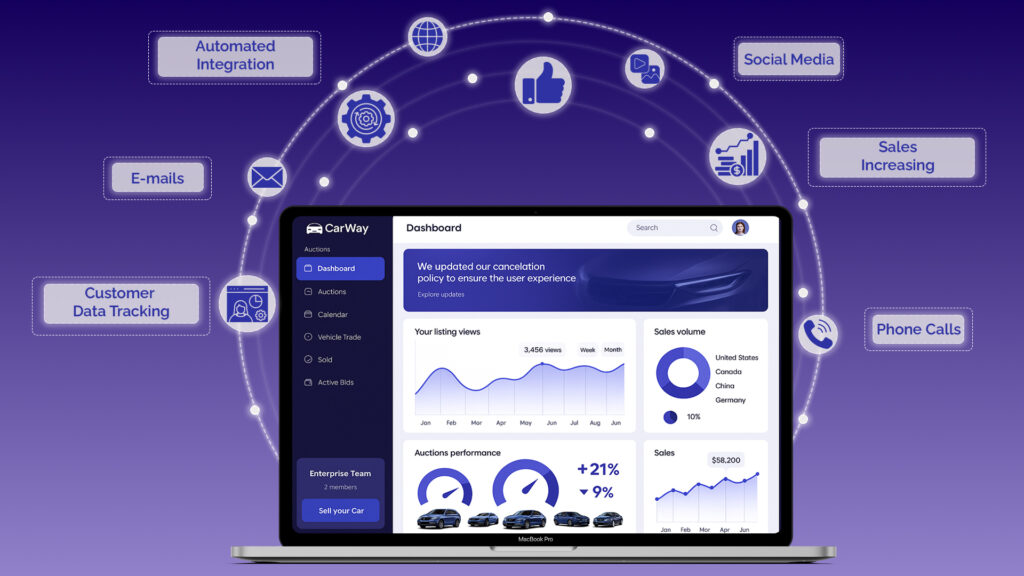
What Does CRM Software for Auto Dealerships Help With?
There are many uses of a CRM for auto dealerships. Dealers who’ve used CRM have seen visible growth in their lead tracking and have been able to close deals a lot faster. By now, it’s clear that CRM software for car dealerships helps manage leads, enhance customer relationships, and automate tasks. However, let’s see exactly how this software operates when a buyer comes to your dealership inquiring about a car.
1. Lead Capture & Assignment
The auto sales CRM captures the customer’s details directly and assigns the lead to an available salesperson. This is done automatically, so there’s not a hint of manual sorting required.
2. Automated Follow-Up
Within a few minutes, the CRM emails or SMS automatically with a personalized follow-up message conveying appreciation for having shown interest and suggesting similar cars based on the browsing history. The rep assigned gets the customer record, including all the customer’s activities.
3. Inventory Integration
The rep has an instant view of what’s in stock, what’s coming, and what vehicles meet the buyer’s criteria, streamlining the match-making process.
4. Task & Workflow Automation
Assume the lead doesn’t respond. Instead of getting lost, the auto dealer CRM prompts a second follow-up and reminds the rep when it’s time to follow up.
5. Collaborative Communication
In the meantime, if the lead drops by the dealership the next day, service and sales staff can pick up where they left off, due to a shared CRM dashboard.
6. Consistent Customer Experience
Each interaction is captured and saved, so customers do not have to repeat themselves and feel valued along the way.
Top 11 CRM Software for Auto Dealerships in 2025
In 2025, choosing the right automotive CRM software is very important to maximize dealership operations and deliver the best customer experiences. Some of the best names in the automotive industry as Spyne, Dealer Socket, and VinSolutions. This list gives you the 11 best CRM software for auto dealerships that can be utilized to optimize lead management, engage, and maximize sales growth.
1. Spyne
CRM Overview:
Spyne’s CRM software for auto dealerships provides an AI-powered and advanced platform made specifically for automotive needs. It’s known for smart lead capture, auto-follow-ups, and omnichannel communication to maximize dealer workflow. The CRM forms part of Spyne’s overall Retail AI suite that includes digital marketing, website builder, and inventory solutions.
Key Features:
- AI-based lead scoring
- Multi-channel follow-up automation
- Outbound marketing for lead recovery
- In-depth customer information for personalization
Rating: 4.8
Pros:
- Made specifically for used car dealerships
- Easily integrates with website and inventory software
- Task automation frees sales reps
- Fast onboarding and clean dashboard design
Cons: None
2. ProMax
CRM Overview:
ProMax provides an all-in-one solution for automotive dealerships. Their CRM suite has desking, compliance, and credit reporting tools in one place, along with marketing automation.
Key Features:
- CRM + desking + credit
- Compliance tracking
- Marketing automation
- Customer follow-up tools
Rating: 3.9
Pros:
- All-in-one platform
- A good option for finance-heavy dealerships
- Affordable pricing
- Strong compliance tools
Cons:
- The interface may lag
- May have outdated tracking abilities
3. Podium
CRM Overview:
Podium is a communication-first CRM for auto dealerships with reviews, messaging, and payment integration. It’s most often used to handle leads and customer interactions.
Key Features:
- Text-based lead communication
- Google review and feedback automation
- Unified inbox across all channels
- Integrated payments
Rating: 4.4
Pros:
- Great for online reputation management
- Extremely effective review generation tools
- Text communication streamlined
- Easy to use
Cons:
- May have issues training AI
- Limited CRM features
4. Drive Centric
CRM Overview:
Drive Centric’s auto dealer CRM software is characterized by a modern UI, video messaging, and automated marketing that allow sales teams to engage with leads on a personal level.
Key Features:
- Real-time communication functionalities
- Video and SMS integrations
- Mobile-first design
- Engagement tracking
Rating: 4.5
Pros:
- Responsive and quick platform
- Strong video marketing functionalities
- Simple-to-use dashboard
- Suited for technology-minded teams
Cons:
- AI can potentially remove leads from salespeople
- May be hard to comprehend for new users
5. DealerSocket
CRM Overview:
DealerSocket automotive CRM aids independent and franchise dealerships in managing leads. It’s well known for its robust features and scalability.
Key Features:
- Lead tracking and sales
- Custom dashboards
- Marketing automation
- Desking along with equity mining tools
Rating: 4.0
Pros:
- Complete dealership tools
- Established company in the market
- Strong DMS integrations
- Extremely customizable
Cons:
- UI could be outdated
- May have a few operating bugs
6. AutoRaptor
CRM Overview:
AutoRaptor is a CRM offering lead management and sales process improvement tools. It is simple to use and includes basic features.
Key Features:
- Text and email messaging
- Lead routing and scoring
- Task list management
- Access via mobile app
Rating: 4.6
Pros:
- Simple and intuitive
- Affordable price
- Good customer service
- Solid mobile capabilities
Cons:
- Might not be as customizable
- Could be difficult for users to access spreadsheets
7. VinSolutions
CRM Overview:
VinSolutions CRM for auto dealerships helps them efficiently manage leads and enhance customer relationships.
Key Features:
- Centralized lead management
- Real-time reporting
- Automated campaigns
- Service and sales integration
Rating: 4.6
Pros:
- Deep integration abilities
- Scalable for large operations
- Powerful reporting tools
- Great for multi-location dealers
Cons:
- May be slow to use
- Has occasional operational issues
8. CDK Global
CRM Overview:
CDK Global is a cloud-based solution for the automotive industry that helps in lead management and has integration abilities.
Key Features:
- CRM-DMS integration
- Service scheduling
- Equity mining
- Lead source tracking
Rating: 4.1
Pros:
- Enterprise-grade functionality
- Great support for OEM integrations
- Scalable and reliable
- Comprehensive analytics
Cons:
- Complex setup
- May lack some reporting features
9. Reynolds & Reynolds
CRM Overview:
Reynolds & Reynolds offers a CRM called FOCUS, which helps in centralizing all operations for dealerships of all sizes.
Key Features:
- Lead and opportunity management
- Retail transaction workflows
- Advanced F&I tools
- Integrated marketing
Rating: 4.6
Pros:
- Great for compliance-heavy environments
- Longstanding industry reputation
- Robust F&I tools
- Integrated approach
Cons:
- Outdated interface
- Steep learning curve
- Expensive
- Limited flexibility
10. DealerTrack
CRM Overview:
DealerTrack’s automotive solution offers CRM, DMS, and F&I tools. It focuses on enhancing customer relationships and improving profitability
Key Features:
- Lead management
- Desking and deal structuring
- Credit and compliance tools
- Inventory and finance integrations
Rating: 4.4
Pros:
- Great for F&I workflows
- Strong back-end tools
- Broad integration support
- Trusted by large dealer groups
Cons:
- May have some operational lags
- The system may be complicated at times
11. DealerMine
CRM Overview:
DealerMine is a car dealer CRM that combines customer information under a single dashboard for a dealership’s convenience and provides sales and service optimization tools.
Key Features:
- Service appointment scheduling
- Targeted email campaigns
- Customer retention tracking
- Sales analytics
Rating: 4.0
Pros:
- Good for service-driven dealerships
- Easy BDC integration
- Strong retention focus
- Simple interface
Cons:
- May take time to load when busy
- The price may be high for small dealerships
Top 10 Benefits of Using CRM Software for Auto Dealerships
Using CRM software for auto dealerships has many benefits, such as better customer relationships, improved lead management, increased sales, and faster operations. Dealership CRM providers combine all customer information under a single dashboard, provide personalized interactions for more loyal bonds, and display analytics to help improve your dealership’s decision-making. All of these aspects help enhance profitability and productivity.
1. Store Every Customer Detail in One Place
You don’t need to struggle with scattered spreadsheets when you can view purchase history through to service records within seconds, so your team is on the same page.
2. Make Every Interaction Feel Personal
Use smart insights into customer preferences and browsing history to make emails, promotions, and service follow-ups really speak to them.
3. Let the CRM Do the Follow-Ups
Automated email, reminders, and task assignment ensure no lead slips through the cracks, all while preventing your team from wasting hours.
4. Sell Smarter, Not Harder
Car dealer CRM software frees up your salespeople to close more deals faster with one-click access to lead info, status updates, and conversation histories.
5. Launch Marketing That Converts
Organize your audience based on what they want to see and what they’ve bought before, so you can deliver offers that encourage action, not just shot-in-the-dark promotions that don’t do much.
6. Always Know What’s in Stock and What’s Selling
Track inventory in real-time and use CRM insights to predict demand, avoid overstocking, and keep your lot moving fast. Know the best places to source cars and keep premium vehicles so you can appeal to customer demand.
7. Turn Customer Visits Into Loyalty Moments
Make a good impression on customers by sending them service reminders and updates often. Give them a personalized experience that brings them back.
8. Make Test Drives and Appointments Effortlessly
CRM makes the online booking process easy for your customers. With just a click, they can set their preferred date and time, and your CRM automatically handles confirmations, team alerts, and daily routines.
9. Convert One-Time Buyers to Lifelong Customers
Keep customers informed with constant check-ins, exclusive promotions, and thoughtful follow-ups that put your dealership in their minds.
10. Put Your Entire Dealership on the Same Page
Everyone is on the same page, from sales to service, reducing errors, delays, and miscommunication.
12 Essential and Unique Features of CRM Software for Auto Dealerships
CRM software for auto dealerships provides various features that help optimize their sales process and increase customer engagement. A car dealer CRM features include multi-channel lead management, reporting analytics, customer experience optimization, and the overall smooth functioning of operations.
1. Seamless Lead Management from Multiple Sources
Capturing leads from any and every source should be the goal of every car sales software. Whether it’s your website, social media posts, or calls, a CRM system should see them through the entire sales process. Features like lead organization, automated follow-ups, personalized reminders, and lead assignment to reps are what make a CRM worth investing in.
2. Analytics and Reporting for Continuous Improvement
With a professional CRM system, any automotive dealership could easily gain important insights into how their sales are doing, how customers are responding to campaigns, and the traffic their website is generating, to name a few. These reports would help them make informed decisions and improve sales strategies accordingly.
3. Customer Information in a Single Place
Centralised storage of customer details, including purchase history, preferences, contact information, and service history. This helps dealerships understand customer needs and offer personalised experiences. It also tracks all customer interactions (emails, calls, chats, etc.), which allows sales teams to respond to customers and ensure they’re constantly and proactively engaged.
4. Sales Process Automation for Increased Productivity
Routine tasks like email campaigns, follow-up reminders, and order confirmations are done automatically, so they’re faster and can be sent out in bulk to many customers at the same time. This automation eliminates manual effort and saves quite a lot of time, freeing up your sales team to focus on other sales aspects and also ensures no customer is missed.
5. Inventory Management and Tracking
Aside from sourcing suggestions from top-performing marketplaces, inventory levels are tracked with an integrated CRM system. This allows sales teams to quickly check which vehicles are available so they can recommend the right vehicle to customers.
6. AI-Based Features to Stay Ahead
Modern CRM software uses AI insights to examine how their leads are performing and how likely they are to convert into sales opportunities. This AI-backed information helps dealerships personalize their customer interactions and be different from their competitors.
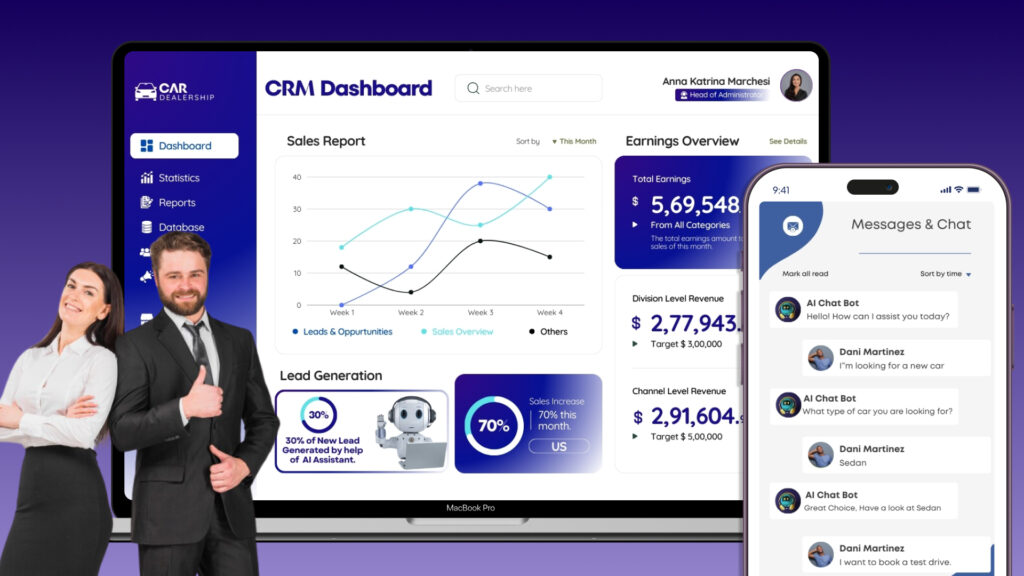
7. Mobile CRM for an Optimized Experience
More people carry smartphones in today’s day and age. This means that they’re shopping online, too. An automotive CRM makes the car-buying journey efficient and convenient for mobile users and ensures communication can be done on the go.
8. AI-Powered Lead Scoring
Automatically scores leads by their chances of conversion, thus saving the time of the sales teams. This feature prioritizes leads that are most likely to convert to sales opportunities, which saves your team time and allows you to focus on high-intent buyers and showcase your vehicles and services to prospects almost guaranteed to buy.
9. Integrated and Seamless Omnichannel Communication
Coordinates all communications through a single dashboard, including email, phone calls, and social media. So, you can easily reach out to customers to remind them of their appointments, answer questions about your inventory, and always keep them updated on promotions and discounts.
10. Predictive Analytics to Forecast Demand
Deals can be forecasted ahead of time to understand the sales potential, optimise marketing campaigns, and better manage inventory. You can make informed decisions based on what you already know regarding your sales patterns, like how fast cars sell, what cars sell the most, and the automotive marketing ROI each vehicle is giving you.
11. Virtual Showrooms and Online Sales
CRM for automobile industry is being added with new capabilities, such as access to virtual showrooms and online vehicle purchase platforms, so vehicle purchases can now be completed online. When customers can visualize the vehicle they’re getting, you’re able to retain their attention better and keep them on your site longer.
12. Dedicated Support and Expertise
CRM software for auto dealership gives you support and a team of people who are dedicated to helping you achieve your dealership’s goals. This team would provide ongoing support on how to launch and operate the CRM and ensure you gain maximum profit.
3 Types of CRM Software for Auto Dealerships
Choosing the best CRM software for auto dealerships involves identifying the types of dealer CRM systems available. You need to analyze your needs and wants and then pick the version that suits your needs. Generally, there are three types of CRM systems for the automotive industry:
1. Operational CRM
Automates and streamlines routine sales, marketing, and customer support processes. An operational type of CRM vehicle software improves efficiency by automating lead nurturing and follow-ups, which otherwise would be the work of sales teams, leaving them enough time to focus on high-value activities.
2. Analytical CRM
Analyses purchaser behavior and trends based on the information of various customers. This enables the dealership to understand preferences, optimise marketing strategies, and predict potential future sales. Analytical CRM is necessary for making appropriate data-driven decisions towards better sales and customer engagement.
3. Collaborative CRM
Encourages teamwork in departments such as sales, service, and marketing, enabling them to share customer information and insights in real time. This type of CRM will help create a more aligned customer experience, as employees are all on the same page when interacting with any lead or customer.
Selecting the Right CRM Software for Auto Dealerships: Top 10 Elements to Look For
The right CRM software for auto dealerships will depend on several factors, such as the size of your dealership, sales volume, specific needs, region, and more. Evaluate the following criteria when researching CRM options:
1. Ease of Use: Select a user-friendly CRM that is easy for your salespeople to understand.
2. Customization: Make sure the CRM can be modified to fit your dealership’s specific needs.
3. Integration: Choose a CRM that integrates easily with other tools you use, like inventory management or marketing platforms.
4. Support and Training: Consider a CRM that provides vital customer support and training resources.
5. Key Features: Make sure the CRM includes key features such as contact and lead management, task automation, analytics, and communication so that your whole customer journey is smooth.
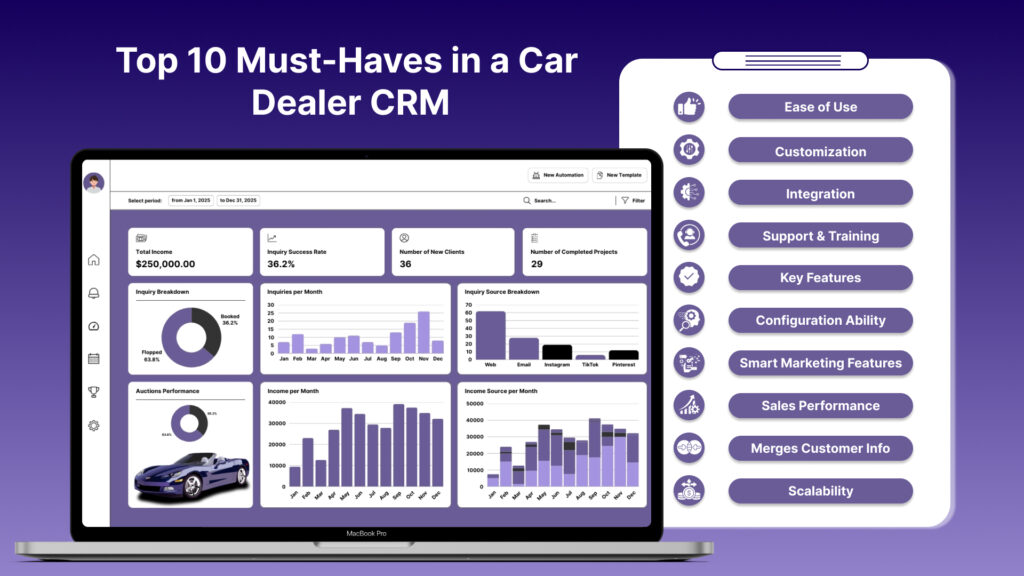
6. Configuration Ability: Choose a CRM that can be readily configured to your dealership processes without extra effort and development.
7. Smart Marketing Features: Ensure that your CRM makes it simple to launch automated, data-driven campaigns that engage and convert leads at each stage of the sales process.
8. Data-Driven Sales Performance: Opt for a CRM with real-time analytics, reporting, and dashboards that put your team on the same page and in performance mode.
9. Merges Customer Information: The best CRM for auto dealerships shows customer information in one location and uses insight to maximize experiences and automate workflows.
10. Scalability: The used car dealer CRM needs to grow with your business, be it a franchise, dealer group, or independent lot, with the framework and tools to keep pace.
How to Integrate and Optimize CRM Software for Auto Dealerships
Once you have picked your ideal CRM software for auto dealerships, a quick and systematic implementation becomes the key to maximising its full potential. Here’s how to optimise CRM in automobile usage:
1. Train the Staff: Ensure your sales and marketing team is prepared to use the auto dealership software appropriately. Doing this will ensure the efficiency of your sales and service teams.
2. Centralise Information: Centralise all interactions and information with customers into one system that maintains a unified view of that customer. This is helpful when personalizing marketing and catching up on customer activity.
3. Analyse and Learn: Continue to analyse the data received from your CRM and make adjustments based on the feedback from the analysis to maximise involvement and sales.
4. Automate Routine Tasks: The CRM’s automation feature can automate repetitive tasks like sending a follow-up email or arranging a test drive.
5. Monitor ROI: Monitor your CRM’s performance to gauge its effects on customer satisfaction, lead conversion rates, and overall sales.
How Spyne Provides the Best CRM Software for Auto Dealerships
Spyne’s automotive CRM equips used car dealerships with tools for smart lead management, automated marketing, and 24/7 customer interaction. Here are our prominent features that simplify operations, increase conversions, and improve the overall customer experience through AI-powered automation.
1. Effortless Lead Capture and Smart Syncing
Spyne’s AI CRM, Connect.ai, captures leads from websites, social media, and marketplaces. The automatic synchronization and organization of leads into the sales pipeline allows every customer to be recorded and prevents opportunities from falling through the cracks.
2. Reactivate Cold Leads through Targeted Marketing
Spyne’s CRM for auto dealerships converts existing customer data into live outbound campaigns. Using automotive service CRM, cold leads are re-connected with, engaging a wider base who are looking for your services.
3. Monitor Performance through Real-Time Performance Reports
With performance graphs, you can track your dealership’s market performance and customer reaction to your campaigns. Using our car dealer CRM system, you can also track leads, employee productivity, and follow-up to continually improve your sales process and customer interaction.
4. 24/7 Virtual Receptionist for Top-Tier Customer Engagement
Spyne’s AI-powered call bot and receptionist agent interact with customers 24/7. It answers inquiries pertaining to inventory, interest, and budget, never missing a lead.
5. Automated Marketing with Multi-Channel Touchpoints
Our solution is called the best CRM for car dealers as it automates personalized follow-ups and promotions via email, SMS, and social media. With multi-channel communication, you can be in constant contact with your customers and never miss a follow-up. Its seamless integration boosts your visibility, sending in a continuous flow of targeted customers.
6. Streamline Operations with Smart Task Management
Spyne’s best auto dealer CRM automotive retail solution automates task assignment and workflow automation. From lead management to job assignment in service departments, it gets your team in sync and maximizes customer satisfaction.
Conclusion
Choosing the right CRM can transform the workflow, marketing, and levels of customer satisfaction in your dealership. From artificial intelligence-based lead scoring to omnichannel contact, a modern CRM software for auto dealerships is a lifesaver for your business operations. You may be an individual location dealer or a growing franchise, but investing in a CRM that addresses automotive needs is a wise investment. Explore your options, weigh features, and prepare for a more efficient, connected, and profitable dealership experience. With that being said, choose Spyne today, book a demo, and see how our automotive dealer CRM can give you real results!

